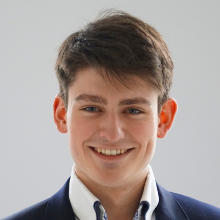Kontakt
Pfaffenwaldring 9
70569 Stuttgart
Deutschland
Raum: 2.241
Sprechstunde
Nach Vereinbarung können Sie gerne in meinen persönlichen Meetingraum kommen.
Fachgebiet
Datenbasierte Modellierung und Simulation biochemischer Systeme (Systembiologie)
- Wagner, V., & Radde, N. (2021). SiCaSMA: An Alternative Stochastic Description via Concatenation of Markov Processes for a Class of Catalytic Systems. Mathematics, 9, 1074. https://doi.org/10.3390/math9101074
- Wagner, V., Castellaz, B., Oesting, M., & Radde, N. (2022). Quasi-Entropy Closure: A Fast and Reliable Approach to Close the Moment Equations of the Chemical Master Equation. OUP Bioinformatics, 38, 4352–4359. https://doi.org/10.1093/bioinformatics/btac501
- Wagner, V., Höpfl, S., Klingel, V., Pop, M. C., & Radde, N. E. (2022). An inverse transformation algorithm to infer parameter distributions from population snapshot data. IFAC-PapersOnLine, 55(23), Article 23. https://doi.org/10.1016/j.ifacol.2023.01.020
- Wagner, V., Strässer, R., Allgöwer, F., & Radde, N. E. (2023). A provably convergent control closure scheme for the Method of Moments of the Chemical Master Equation. Journal of Chemical Theory and Computation, 19(24), Article 24. https://doi.org/10.1021/acs.jctc.3c00548
- Wagner, V., & Radde, N. (2023). The impossible challenge of estimating non-existent moments of the Chemical Master Equation.
- Adam, S., Anteneh, H., Hornisch, M., Wagner, V., Lu, J., Radde, N., Bashtrykov, P., Song, J., & Jeltsch, A. (2020). DNA sequence-dependent activity and base flipping mechanisms of DNMT1 regulate genome-wide DNA methylation. Nat. Communications, 11(1), Article 1. https://doi.org/10.1038/s41467-020-17531-8
- Höpfl, S., Tautenhahn, H.-M., Wagner, V., & Radde, N. E. (2024). Marginal Percentile Intervals in Bayesian Inference are Overconfident. IFAC-PapersOnLine.
- Wagner, V., Jantz, L., Briem, H., Sommer, K., Rarey, M., & Christ, C. (2017). Computational Macrocyclization: From de novo Macrocycle Generation to Binding Affinity Estimation. ChemMedChem, 12, 1866–1872. https://doi.org/10.1002/cmdc.201700478
- Assistent für Wahrscheinlichkeitstheorie und Statistik (seit dem WS19/20)
- Assistent für Simulationstechnik A (WS 19/20)
|
Seit 12/2019 |
Wissenschaftlicher Mitarbeiter erst am Institut für Systemtheorie und Regelungstechnik und später am Institut für Stochastik und Anwendungen der Universität Stuttgart, Deutschland. |
|
10/2017-11/2019 |
Master Studiengang Simulation Technology an der Universtät Stuttgart, Deutschland
|
|
Sommersemester 2017 |
Praktikum: Bayer AG, Berlin |
|
Wintersemester 2016/2017 |
Praktikum: King Abdullah University of Science and Technology, KSA |
|
10/2013-09/2017 |
Bachelor Studiengang Simulation Technolgy an der Universität Stuttgart, Deutschland
|
|
06/2013 |
Abitur an der Schule Schloss Salem, Überlingen, Germany |


